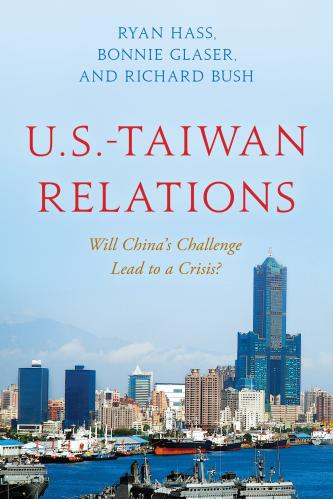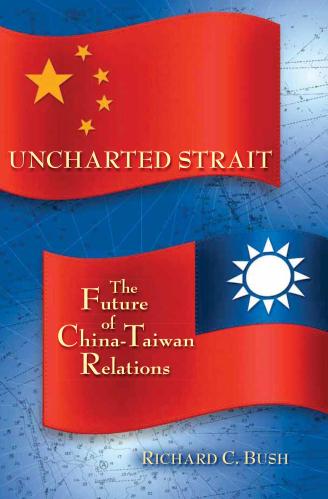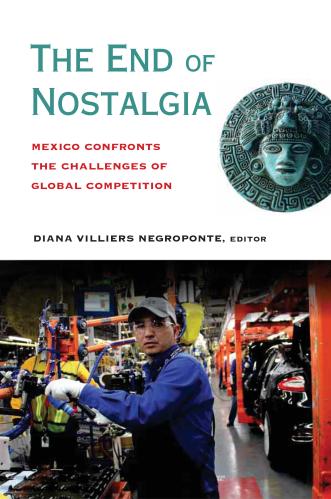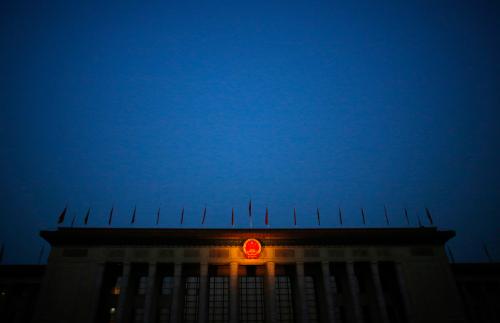Executive Summary
 Taiwan has gotten high marks when it comes to holding clean elections and protecting political rights. The public strongly supports democracy in principle and by and large approves the island’s system in practice. When it comes to performance, however, the political system does not do so well. This is partly because of a set of structural factors. Selecting the president and legislature on a majoritarian basis fosters a degree of polarization and complicates the crafting of policy compromises. Periodically, social and political forces seek to circumvent the institutions of representative government (via mass protests, for example). They can block what they oppose but are unable to solve the problems that provoked their action in the first place. Another reason is that the issues to be addressed are not easy. Taiwan’s economy is maturing; young people lack employment opportunities; the population is aging; and the birth rate is very low. The most challenging issue is China and its ambitions regarding Taiwan. So, the stakes for Taiwan’s democracy are high. A failure to perform well would be a tragedy.
Taiwan has gotten high marks when it comes to holding clean elections and protecting political rights. The public strongly supports democracy in principle and by and large approves the island’s system in practice. When it comes to performance, however, the political system does not do so well. This is partly because of a set of structural factors. Selecting the president and legislature on a majoritarian basis fosters a degree of polarization and complicates the crafting of policy compromises. Periodically, social and political forces seek to circumvent the institutions of representative government (via mass protests, for example). They can block what they oppose but are unable to solve the problems that provoked their action in the first place. Another reason is that the issues to be addressed are not easy. Taiwan’s economy is maturing; young people lack employment opportunities; the population is aging; and the birth rate is very low. The most challenging issue is China and its ambitions regarding Taiwan. So, the stakes for Taiwan’s democracy are high. A failure to perform well would be a tragedy.
Introduction
Generally, Taiwan gets high marks for its democracy. It was a poster child for the global “third wave” of democratization that occurred in the 1980s and 1990s. Its transition from authoritarian rule to a representative, electoral system was gradual and peaceful.1 Today, U.S. government officials regularly praise the island’s political progress. The State Department’s annual report of human rights practices says that civil and political rights and the rule of law are well protected.
These positive ratings do have a basis. Elections are free, fair, and highly competitive. In presidential races, turnout usually exceeds 70%. There have been three presidential transfers of power, an indicator of democratic consolidation. The party system is institutionalized, with two large, distinctive parties — the Kuomintang (KMT) and the Democratic Progressive Party (DPP).2 Each is supported by small parties and groupings, producing two political camps. The KMT leads the Blue camp and the DPP the Green camp (named for the colors of their party flags). Civil society organizations have proliferated and pursue their objectives seriously. Polling organizations facilitate a permanent plebiscite on leaders and government policies.
Public views concerning the political system
Despite all these favorable attributes, the island’s public has decidedly mixed views about their democratic system. In the World Values Survey in 2012, 40 to 60% of Taiwan expressed confidence in the central government, civil service, armed forces, and the courts, but rated the press at 28.4%, the Legislative Yuan (LY, the parliament) at 27.6%, and political parties at 22.4%.3
The Asian Barometer Survey has conducted several surveys of public attitudes that probe the degree of satisfaction about Taiwan’s democracy in various ways. The following is the set of responses in the 2014 “wave,” the last one to be done, in declining levels of positivity:
- 88% supported the idea that democracy is still the best form of government, whatever its problems.
- 84% thought that “democracy is suitable for our country.”
- 76% believed that democracy is capable of solving problems in society.
- 68% thought that Taiwan was a democracy, though some thought it had “minor problems.”
- 63% were satisfied with the way democracy worked in Taiwan.
- 63% believed that “democracy was always preferable.”
Unfortunately, these are the last iterations of the World Values Survey and the Asian Barometer Survey. Hence, it is impossible to know whether people in Taiwan have revised their views in the interim, for better or for worse. My best guess is that if opinion has changed, it would be in a negative direction, as politics on issues like China, pensions, same-sex marriage, and so on, became more contentious.
Performance
That two out of three respondents were generally satisfied with their political system is not a bad approval rate. Yet most intriguing were these responses to two other questions:
- Only 23% thought that democracy was more important than economic development.
- 16% believed that protecting political freedom was more important than reducing economic inequality.
That is, performance is more important than process. Democracy is not valued for its own sake, but rather whether its outcomes satisfy what people value.
There is no denying that on a range of issues, the Taiwan political system’s response to policy problems has been suboptimal.
That these survey questions imposed a forced choice on respondents may have biased the results against democratic process. But there is no denying that on a range of issues, the Taiwan political system’s response to policy problems has been suboptimal. These include the government budget; maintaining economic competitiveness; ensuring good jobs for young people; energy security, preserving the environment, and food safety; the generosity of retiree pensions; marriage equality; transitional justice (how far to go in holding accountable the authoritarian KMT regime of the past); judicial reform; and, last but definitely not least, China. On each of these issues, the players — the political leadership, central and local government agencies, political parties, the business community, civil society, and the public — and how they interact varies, depending on the nature of the problem to be addressed. But the results are often policy swings, chronic contention, or even gridlock.
Structural factors
These issues often yield less than satisfactory outcomes because they are very difficult to solve. After all, as Taiwan’s export-led economy matured, the growth rate has declined. As the population has aged and the birthrate dropped, the working population is shrinking in size relative to the number of children and retirees that depend on them. Companies did sustain profits by moving production to China, but changes in the Chinese business environment (e.g. increasing wage demands) have posed new business challenges. Moreover, Beijing seeks to change the status quo in its favor.
Majoritarianism and its consequences
Not only are policy issues substantively complex, certain structural features of Taiwan’s democratic system affect the conduct of politics and complicate policy formulation. A key one is the majoritarian character of the legislature. Beginning with the 2008 election, members of the LY have been elected in two ways (each voter casts two ballots). 64.6% of the 113 members are elected from single-member districts on a “first-past-the-post” basis (the same system as in the United States). The remaining 35.4% are selected on a party basis.4
The result has been a majoritarian system, which has some built-in advantages. The winner-take-all principle tends to produce fewer large parties. Fewer parties mean fewer policy programs from which voters must choose, while too many proposals can produce confusion and gridlock. Legislators chosen from single-member territorial districts are more likely to be responsive and accountable to their constituents than legislators who are picked in multi-member districts.
Yet an electoral system that combines single-member districts and a first-past-the-post rule is actually less representative of voters’ preferences than some alternatives. It almost guarantees that candidates of two major parties will win most of the legislative seats, and that the winning party will get more seats than its share of the vote. Thus in 2016, the KMT and the DPP won 91% of the total LY seats. In the single-member races, DPP candidates got 44.6% of the vote, but won 68.5% of those seats. KMT candidates received 38.9% of this vote and 30.8% of the seats. The same distortion occurs to a lesser degree in the party vote. In 2016, the DPP won 44.1% of the party vote and got 52.9% of those seats. In this contest, the KMT secured 26.9% of the votes and 32.3% of the seats. The presidential election, which is held on the same day as the balloting for the LY, is also on a winner-take-all basis, which reinforces the majoritarian nature of the system.5 Thus, the KMT controlled the presidency and the legislature from 2008 to 2016, and the DPP will do so from 2016 to 2024.6
When one Taiwan party dominates the government for one or two presidential terms, it creates a number of incentives for political polarization, fostering phenomena that do not necessarily contribute to good, representative government:
- The majority party is tempted to try to push through as much of its preferred policy agenda as possible and to eschew compromise with the minority.
- As power shifts from the KMT to DPP and back again, there are fairly wide swings in policy on at least some issues, with each new administration trying to reverse the agenda of its predecessor, rather than making adjustments to a shared consensus position.
- Politics is adversarial, as politicians in each party adopt a “you live, I die” (nihuo, wosi) attitude towards people in the other party.
- Because the parliamentary minority grows frustrated at its ability to accomplish much of its program, it adopts tactics designed to disrupt regular legislative order and to create a fighting image in the media. Seizing control of the speaker’s dais is a favored tactic.
- Another countermeasure is creation of additional, small parties that put forward alternative agendas and seek to gain enough parliamentary seats to gain bargaining power over policy. Taiwan has had a series of third parties since 1993. Many are created as vehicles for the ambitions of an ambitious politician.7 (These parties have often begun well, but over time their influence subsides.)
- A majority party that fears it is about to lose the next election may pass laws while it is still in power in order to make it harder for the opposing power to effectively govern should it win.
In addition, majoritarian rule fosters frustrations among groups outside the LY, in the broader political system at large. The consequences can complicate the operation of representative government.
First, when activist elements in the public oppose the policies of the majority party but see little hope of ending its dominance through electoral means, they have mounted large public protests in the name of the higher good. In these campaigns, they sometimes have the support of the opposition party.
Second, the DPP has long advocated the use of referendums to register the public will. Its initial assumption, no doubt, was that elections to the presidency and the LY were stacked in the KMT’s favor. Legislation was passed in 2003 to authorize the use of referendums, but the two parties have argued over the value and rules for this mechanism ever since. When the DPP won the LY in 2016, it soon passed legislation making it easier to put policy ideas to a referendum vote. In 2018, however, the KMT hoisted the DPP on its own petard by proposing and winning referendums that undermined the Tsai administration’s policies.
Third, from 2018 to 2020, Taiwan also saw a burst of populism, mainly in the form of a KMT politician named Han Kuo-yu. Han ran for mayor in Kaohsiung Municipality, pitting himself as the champion of the common people against Taiwan’s political and economic elites. He won the mayor’s race easily and then was picked as the KMT’s candidate in the 2020 presidential race, where President Tsai Ing-wen defeated him handily.
Each of these gambits reflects a dissatisfaction with the performance of representative government under two-party dominance and attempts to circumvent the normal operation of government.
Factors reducing polarization
Yet Taiwan politics is not a society-wide battle between two sharply divided camps. The public is not as polarized as politicians are. On social values, there is broad uniformity. There is strong agreement that, in principle, democracy is the best political system. The World Values Survey in 2012 found that by and large respondents tended to take a centrist position on issues such as income inequality, private versus government ownership of business, and whether the government or the people themselves should be responsible for people’s welfare.8 People generally agree that economic development, education, and cross-Strait relations are the issues on which the government should focus.
Most significantly, on some issues there are divisions within the major parties which impede them from operating as a unified, disciplined bloc, at least on those issues. The Blue and Green camps are divided into subcamps, with the overall spectrum running from the Deep Blues, through the Light Blues and Light Greens, and then to the Deep Greens. The Deep factions tend to the extreme while the Light ones are more moderate. Within each camp, there have been struggles for power between “Deep” and “Light,” and the results of those struggles can affect politics at large. If the Light factions in each major party are dominant, then inter-party cooperation becomes possible. If the Deep factions are dominant, then zero-sum confrontation is more likely.9
The Deep-Light differences within the Green and Blue camp are not always significant. Generally, the policy issues under debate define which actors are involved and how politics are conducted. Some matters are negotiated within the legislature and between it and the executive, outside of the public eye. Others matters evoke polarization between the major parties. Still others create Light-Deep splits. But the issue that is most divisive within and between parties and at election time is how to address the challenge China poses to Taiwan. It is an issue that is substantively difficult and the one where the stakes are the highest.
The China issue
In a November 2019 report for Brookings’s Global China project, I detailed Beijing’s policy towards Taiwan. To summarize, Beijing seeks to transform the island into a special administrative region of the People’s Republic of China (PRC), using the same formula that it employed for Hong Kong — “one country, two systems” (1C2S) — which would terminate the Republic of China government. It has hoped to achieve this end through persuasion but has not ruled out the use of force. Simultaneously, it has opposed what it perceived (or misperceived) as attempts by Taiwan leaders to create an independent country.
Beijing believed the election of Ma Ying-jeou as Taiwan’s president in 2008 offered the best opportunity to begin movement to unification. It hoped to build on deepened economic interdependence to reach political understandings that eliminated ambiguities about Taiwan’s legal status and the direction of cross-Strait relations. Ma deflected PRC requests for political talks, yet his economic policies stimulated concerns among Taiwan citizens about a dangerous slippery slope. Consequently, economic relations stalled. Then, in 2016, the DPP, led by Tsai, won the presidency and control of the LY, a significant setback for Beijing. China responded with neither accommodation nor military action, but by mounting a campaign of intimidation, pressure, marginalization, and penetration of Taiwan politics by providing support for political organizations and traditional media and manipulating social media. The goal may have been to secure Tsai’s defeat in the 2020 election, but that didn’t happen. So far, therefore, Beijing has failed to advance its policy objective.
Unquestionably, how Taiwan leaders formulate a strategy for preserving Taiwan equities in the face of Beijing’s goals and tactics is not easy. Should it be a combination of accommodation, cooperation, and opposition to independence? Or should it be a mix of economic diversification (less dependence on the PRC market), closer reliance on the United States, improvement of Taiwan’s military capabilities, and an emphasis on democracy to demonstrate the public’s opposition to unification? These are tough calls. If there were an easy solution, it would have emerged long ago. The 2019-2020 crackdown on Hong Kong’s protest movements has only increased opposition to any 1C2S arrangements.
Meeting the China challenge is made all the more difficult because decisions must be processed through Taiwan’s democratic system… Yet divisions between and within camps constrain any effort to forge a coherent policy.
Yet meeting the China challenge is made all the more difficult because decisions must be processed through Taiwan’s democratic system. Fundamentally, that is a good thing because it guarantees that any major change in the status quo will require public consent.10 Yet divisions between and within camps constrain any effort to forge a coherent policy. The Blue camp has more confidence in its ability to manage the China risk, while the Greens have a darker view of PRC intentions (and of the commitment of the Blues to Taiwan’s interests). Then there are divisions within the camps. The “Deep Blue” tend to adhere to the KMT’s long-time anti-independence stance and favors unification of some sort, while the “Light Blue” are more comfortable with Taiwan’s maintaining political distance from China, even as it secures benefits from economic ties with the mainland. The “Deep Green” favor a more radical approach to securing autonomy through measures that call for Taiwanese independence, while the “Light Green” are conscious about both the potential for conflict and the need to sustain the benefits of cross-Strait economic relations. The only thing the two camps generally agree is that they must rely on the United States to deter Beijing and keep Taiwan safe.11
Polarization and initiatives to circumvent representative government have affected policy towards China and complicated the formulation of effective policy. Consider these examples:
- Generally, public discussion of China policy has been conducted on a simplistic basis, reducing it to arguments over identity (Chinese vs. Taiwanese vs. both) and over long-term outcomes (unification vs. independence vs. the status quo), without in either case defining the terms used. A key issue of debate within the two parties is whether the government should accommodate Beijing’s demand that it accept the 1992 Consensus, an ambiguous formula concerning cross-Strait relations. (Less discussed is whether it is appropriate at all for the PRC to impose conditions on Taipei.)
- In the 2008 election campaign, the DPP not only promoted Taiwanese identity, a staple of election contests, but by proposing a referendum on membership for Taiwan in the United Nations, which created concern in Beijing and Washington that it was moving to independence.
- In 2014, the Sunflower Movement mobilized to oppose a draft cross-Strait agreement on trade in services out of fear it would ultimately induce Taiwan’s political capitulation. With the DPP’s aid, activists took over the seat of representative government, the chamber of the LY, and caused the agreement to be set aside. To end the occupation, the LY leadership agreed to pass a bill supervising the negotiation of any economic agreement with the mainland (as of late 2020, no legislation was enacted).
- In 2018, the KMT promoted a referendum restricting the import of Japanese food products produced in the area of the 2011 Fukushima nuclear accident, while elements in the DPP initiated one that would use “Taiwan” as the name of the island’s Olympic team, in violation of an international understanding. The first passed and the second failed.
- In 2019, the DPP became worried that it was going to lose the 2020 presidential and LY elections and that a KMT government would make excessive concessions to Beijing. It used its majority to pass a law that made it almost impossible for any government to negotiate political agreements.12
These actions addressed important policy matters, but their effect has made policymaking more difficult. Whatever the substantive problems with the service trade agreement, effectively suspending the approval process was a poor way to solve them. The KMT’s 2018 referendum delayed for two years new economic agreements with Japan, which would have helped diversify the Taiwan economy. Although the Olympic referendum failed, it created unnecessary alarms in Beijing and a serious, albeit temporary, division within the DPP.
In different ways, Taiwan’s executive branch has been constrained from negotiating with Beijing, even if it might be in Taiwan’s interests to do so and even if the issue of the 1992 Consensus were dealt with. Economic talks are unlikely as long as the bill promised in 2014 on supervision of economic agreements is passed or abandoned (intra-DPP disagreements have kept it in limbo). The 2019 law regulating the negotiation of political agreements creates such a high bar it is doubtful one could ever get approved. These obstacles can only raise concerns in China that Taipei is not serious about addressing cross-Strait differences.
Conclusion
As noted, intra- and inter-party splits, protests, referendums, and populism reflect dissatisfaction with the performance of Taiwan’s system of representative democracy. This is not unique to Taiwan, of course. Other democracies share this performance dysfunction, including the United States. Taiwan does face an array of policy problems, some stemming from its being an advanced economy and aging society. The government budget must somehow allocate scarce resources among economic competitiveness, pensions and health care, and defense. On energy security, debates over conflicting priorities — ensuring supply for manufacturing, reducing environmental pollution, finding the right mix between fossil fuels and renewables, limiting emission of greenhouse gasses, and keeping energy prices low — have stymied formulation of a sustainable policy.
China’s policy ambitions add a unique and weighty layer of difficulty. Debates fester over the degree to which China constitutes a threat; what mix of accommodation, self-assertion, deterrence, and alignment with the United States is appropriate; what definition of Taiwan’s legal status is appropriate; how to sustain a coherent policy over time; and how to ensure sufficient resources and political support for the strategy adopted. It is a welcome development that a series of presidential elections have strengthened the consensus supporting a cautious, status-quo policy, yet the simplistic approach to public discussion of the China challenge limits serious discussion of the dilemmas involved. In short, difficult problems do not easily yield easy solutions, but an open yet divided political system makes it much harder.
Despite the high marks that Taiwan’s democratic system often receives for its election system and protection of political rights, it must be assessed in light of the policy challenges it faces and what is at stake. High stakes increase the need for superior performance. And without question, the PRC’s ambitions for Taiwan imposes a high-stakes challenge for the island’s leaders and its people. The outcome will likely define the island’s long-term future. That being the case, does Taiwan’s democratic system mitigate difficult policy dilemmas or exacerbate them? Does it facilitate consensus on how to approach the challenges of the future, or does it intensify the disagreements and create gridlock?
This analysis of Taiwan’s polarized and majoritarian system and the ways in which that at least some citizens have expressed their dissatisfaction with representative democracy suggests that on the tough issues, the public could be better served by its elected politicians. That statement is not meant to impugn their character, but rather to point to features of the system that make it harder for them to tackle the tough issues. That a majoritarian system overrepresents the majority and underrepresents the minority does not facilitate compromise, particularly when the minority party is weak. The history of the KMT’s past authoritarian rule, memories of which still shape the political consciousness of the older generation, exacerbates polarization. There is a structural character to the island’s political dysfunction.
There are, however, times when Taiwan’s system performs well. Far and away the best example is the response to the spread of the coronavirus. At the end of 2020, Taiwan, with a population of 23 million people, had registered about 800 cases and only 7 deaths. Much of the credit goes to the public health authorities, which successfully employed border controls, testing, contact tracing, and quarantines to keep the number of cases low. They had learned from problems in dealing with the SARS epidemic of 2003. In addition, the leadership of the Tsai administration was united, serious, and transparent. Members of the public, who had been socialized to use masks when they get a cold, did not need official persuasion to do the same when it came to the coronavirus. Members of the LY did not politicize the issue, perhaps because they understood the stakes. In short, the political leadership, the technocracy, politicians, and the public worked together to create an exemplary result. All concerned understood the stakes of failure.
Taiwan’s structural impediments to good policy performance are not easily fixed. Any alternative to majoritarianism would have its own defects, and it would require a constitutional amendment to institute (a non-starter). If there is a way to mitigate the current division, it probably will require the leaders of the two political parties to set boundaries on their competition: in assessing the nature of policy problems, particularly with respect to China; in working harder to forge compromises to address those problems; and in setting aside the prevailing zero-sum political culture. This way out seems unlikely, given the chronic, interparty contention over the China issue. Yet the stakes involved are very high and the cost of failure would be severe. If chronic political strife makes a consensus policy decision impossible, a decision has been made anyway.
Bringing about Taiwan’s democratic transition thirty years ago was far from easy, but it gave citizens a say on their future that they had never had. Difficult as today’s policy challenges are, it would be a tragedy if the system of representative government was unable to chart a favorable path forward for the people the system is supposed to serve.
-
Acknowledgements and disclosures
Ted Reinert edited this paper. The research on which it is based was supported by a grant from the Smith Richardson Foundation.
-
Footnotes
- Larry Diamond, The Spirit of Democracy: The Struggle to Build Free Societies throughout the World (New York: Times Books, 2008), 88–112; Linda Chao and Ramon Myers, The First Chinese Democracy: Political Life in the Republic of China on Taiwan (Baltimore: Johns Hopkins University Press, 1997).
- Kharis Templeman, “The Party System Before and After the 2016 Election,” in Dynamics of Democracy in Taiwan: The Ma Ying-jeou Years, eds. Kharis Templeman, Yun-han Chu, and Larry Diamond (Boulder, CO: Lynne Reiner Publishers, 2020), 125.
- In link, see download “WV6_Results_Taiwan 2012_v20180912” under “Taiwan 2012.”
- Before 2008, Taiwan elected members from multi-member districts, which created the possibility of several major parties or groups that reflected the range of policy platforms along the political spectrum.
- Larry Diamond, Developing Democracy: Toward Consolidation (Baltimore: Johns Hopkins University Press, 1999), 100–101.
- The president may serve two consecutive terms.
- For example, Ko Wen-che, the charismatic mayor of Taipei City, in 2019 created the Taiwan People’s Party.
- In link, see download “WV6_Results_Taiwan 2012_v20180912” under “Taiwan 2012.”
- These intra-party groupings were partly the result of Taiwan’s postwar political history. Simply put, today’s Deep Blue politicians are the heirs of mainlander authoritarian rule, while the Light Blues began as native Taiwanese that the KMT coopted into its regime (each adapted to the democratic system). The split in the DPP stems from differences over how radical to be in confronting the authoritarian regime.
- Any such change, and certainly any movement towards unification, would likely require the passage of constitutional amendments, which is very difficult. Passage requires a three-quarters majority in the Legislative Yuan and then a referendum where a majority of eligible voters approve. The net effect is that no amendment gets passed unless the KMT and the DPP agree that it is a good idea.
- These struggles occur in different ways in each major party, but the more moderate wing in each has to resist pressures from the more radical wing.
- See Richard C. Bush, Difficult Choices: Taiwan’s Quest for Security and the Good Life (Washington, DC: Brookings Institution Press, forthcoming in spring 2021), https://www.brookings.edu/book/difficult-choices/.
The Brookings Institution is committed to quality, independence, and impact.
We are supported by a diverse array of funders. In line with our values and policies, each Brookings publication represents the sole views of its author(s).









Commentary
Taiwan’s democracy and the China challenge
January 22, 2021